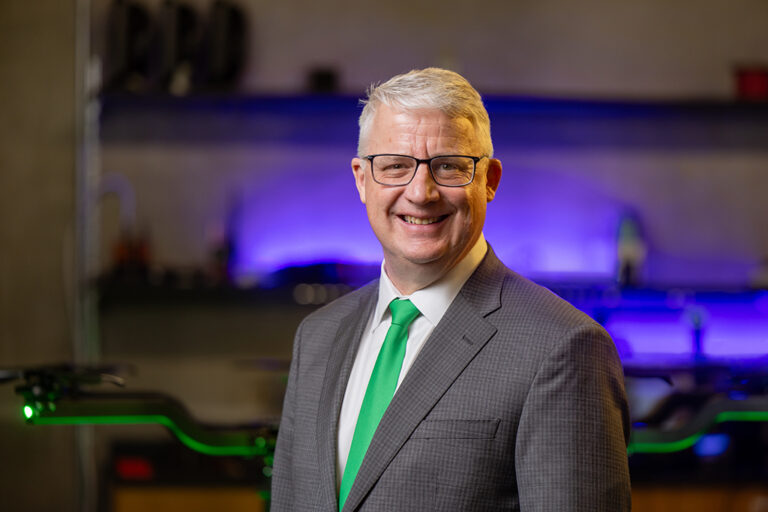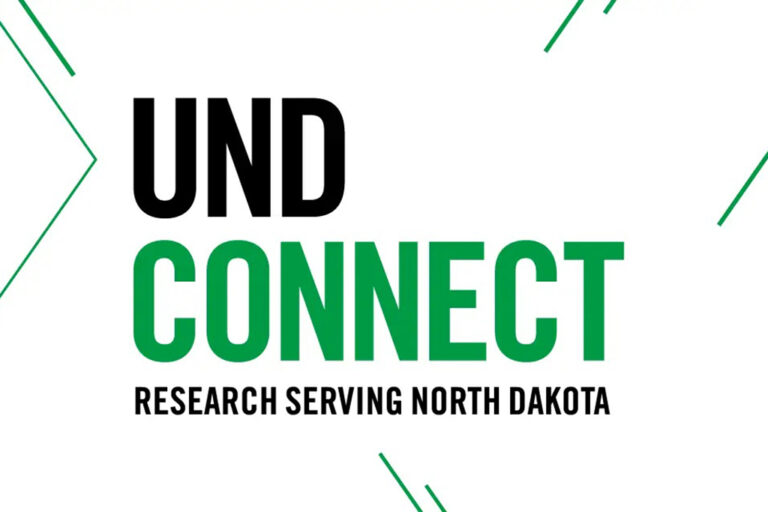Graduate student gravitas
GRAD 2018 fosters interdisciplinary collaboration & communication, showcases research enterprise

English master’s student Casey Kohs was one of the lone literary scholars in a swarm of more than 150 geographers, space investigators, psychologists and other graduate-level academics packing the UND Memorial Union Ballroom on March 6.
But Kohs was unruffled, even with the responsibility of repeatedly explaining her current research into French folklore and transgender identity.
“I kind of love being next to the guy playing violin. It’s been very calming all day – I have no anxiety,” the Minneapolis native laughed, referring to the fellow graduate student two posters down, taking bow to string to musically present his work.
It’s this kind of cross-discipline variety that, in just its second year, has made UND’s Graduate Research Achievement Day – or GRAD – a beacon of the breadth and quality of research, scholarship and creative activity happening in the UND School of Graduate Studies.
“This is the most exciting day in my year,” said Grant McGimpsey, graduate school dean and VP of Research and Economic Development. “I see these students as the lifeblood of research at this University. Without the graduate students, we don’t have a research university.”
McGimpsey and his team started GRAD in 2017 with three goals in mind. They wanted to give students a platform to perfect the communication of their research, to foster collaboration between disciplines, and to show the community how UND’s students are driving societal change – a key role of the UND Strategic Plan’s Grand Challenge initiatives.
“The research they’re doing has implications for the community, for the campus, for the region, for the state and for the country. In some cases, for the world,” said Associate Graduate School Dean Chris Nelson. “People should know that.”
Communication and collaboration
Organizers of this year’s GRAD used feedback from the inaugural event to enhance year two. This time, participants were offered a workshop to bolster their presenting skills and were given extra time to walk around and check out other posters.
“It’s a good forum for providing a basis for interdisciplinary conversations,” Nelson said.
Those collaborative and communication-building exchanges happened not just amid grad students, but also the more than 100 faculty and guest judges that spent the day bouncing from poster to poster.
“The judges are not necessarily within the discipline in which the students are presenting,” said judge and mathematics professor Ryan Zerr. “It’s relatively easy to talk to people who know what you’re up to in terms of research. But the future is going to be more and more dominated by instances in which we have to ‘make a case’ for what we’re doing.”
“Faculty in certain areas are learning what others are doing in other areas – they’re interested in it, they’re making connections and finding ways to collaborate,” Nelson added. “Beyond the students, two of the faculty judges who met today, from different areas, also found some interesting common ground and now want to collaborate.”
Student-to-student discussions led the graduate body to honor chemical engineering master’s student Kathryn Hall with the GRAD Peer Choice Award for her crisp and relevant presentation of her research into novel lignin-based biocomposites.
If you’re wondering what that means – Hall won for her easy explanation.
“I wasn’t expecting this at all!” she grinned, sparkling award in hand. “Currently, there’s a global waste problem, and that’s how I started my presentation. We have a lot of plastic buildup, so I related it in that way. There’s a biocomposite that is actually able to replace that – as a filler, or almost completely as a 100 percent biodegradable composite.”

Service to the state
While Hall is saving landfills from plastic, first-year biomedical engineering master’s student Joseph Allen Jr. is saving patients from the sting of a needle.
After carefully pinning his white “GRAD Finalist” ribbon to his poster, Allen Jr. explained that he and his team have found a non-invasive method of determining glucose levels in diabetics.
“Individuals won’t have to prick themselves to get their glucose levels and get the proper nutrition or insulin that they need,” he said. “Not monitoring glucose can lead to problematic issues. This non-invasive version would hopefully increase compliance and adherence of folks to take better care of themselves.”
Allen Jr.’s device is heading to clinical trials with Altru Health, and then hopefully to the FDA for approval. If successfully commercialized for diabetes, it could help battle one of North Dakota’s largest public health issues.
State Rep. Emily O’Brien, R-Grand Forks, had prospects like these in mind when was asked to guest judge GRAD. As a UND entrepreneurship alum, she jumped at the chance to connect with the state’s next leaders in action and bring their ideas to Bismarck.
“There are so many opportunities here that are untapped,” Rep. O’Brien said. “So I want to make sure that UND’s grad students and researchers are communicating with the people that are looking for this information, so we can fill those areas of need.”
Word’s out
GRAD and events like it are central to opening public eyes to UND’s research potential.
The Graduate School invited area high school students to inspire their innovative pursuits, asked UND undergraduates to assist to wet their feet in the graduate experience, and urged Grand Forks community members to come take a look.
“The more people who see what it is we’re doing, and that what our students are doing has a direct impact on their lives, the more people start to understand why it’s important,” McGimpsey said.
The open venue of community discussion felt like a gift for many student scholars like Kohs.
“This is another opportunity for me to share my research with those who definitely wouldn’t have contact with it otherwise,” she said.
GRAD 2018 Award Winners
Engineering
1st Place – Tarek Elderini, Electrical Engineering
2nd Place – Jeremy Lewis, Chemical Engineering
3rd Place – Robeam Melaku, Civil Engineering
Natural Science
1st Place – Tim Wuenscher, Geology & Geological Engineering
2nd Place – Smruthi Rudraraju, Biomedical Sciences
3rd Place – Meghan Rodriquez, Biomedical Sciences
Professional, Social Sciences, Humanities & Arts
1st Place – Diego Rodriguez, Music
2nd Place – Neha Patel, Geography
3rd Place – Alex J. Holte, Experimental Psychology
Peer Choice
Kathryn Hall, Chemical Engineering


